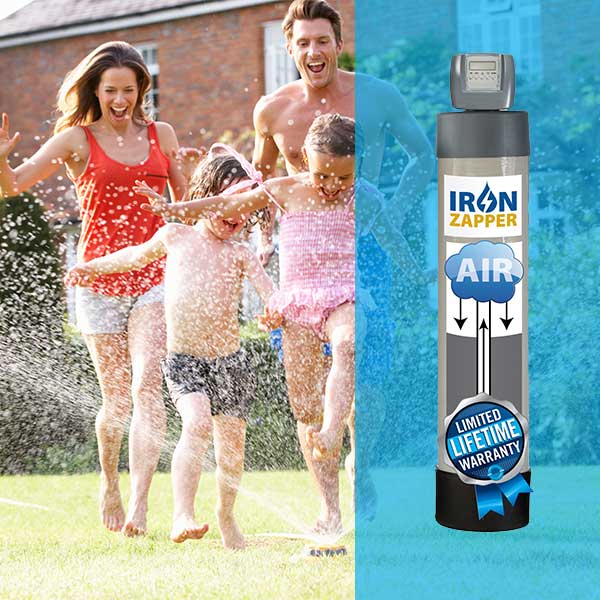Ew…what’s that rotten egg smell?
That, my friend, is the smell of hydrogen sulfide or sulfur. The odor of rotten eggs is commonly caused by the levels of sulfur bacteria and hydrogen sulfide gas in your water supply. This unpleasant scent indicates a larger issue you have with an imbalance of chemicals in your water. That’s what you’ll need to fix in order to eliminate the rotten egg smell. However, it’s not that simple. Before you can just eliminate it, you’ll need to discover where it’s coming from.
Where does sulfur come from?
Sulfur itself is a mineral that is found in natural areas around hot springs and in volcanic regions. Like other minerals that you ingest daily, sulfur is also in your food. Vegetables like broccoli, cauliflower, cabbage, kale, lettuce, sweet corn, eggplant, and more are sulfur-rich foods. Hydrogen sulfide is created naturally by decaying organic matter. It’s a gas released by sewage sludge, liquid manure, and sulfur hot springs (yuck!). It is also formed when sulfur is removed from petroleum products.
In short, hydrogen sulfide gas may find its way into your water source through decaying organic matter, chemical reactions between soil and rock that contain sulfur, and from a reaction in your water heater itself. Locating the source of the issue and the water that the sulfur is present in will be key in eliminating the smell and taste from your water source.
How to identify the source
When you’re looking to identify the source of the sulfur, there are three concrete steps that you can take.
- Hot water: Tests both your hot and cold-water taps. If you only your hot water tap disperses water with the smell, then it’s likely an issue with your hot water heater. If this is the issue, you’ll want to contact your local plumber so he can help you with the repair. A concentrated chlorination treatment is a common temporary solution for a hot water heater. An impose current anode treatment is also a more permanent solution that can limit the proliferation of bacteria in the tank itself.
- Treated water: If both your hot and cold water smelled of rotten eggs, then the next step should be checking the difference between your treated and untreated water. If your untreated water smells find, then it may be a problem with your water softener. This can be an easy fix. All you need to do is have the plumbing fixture serviced.
- All water: If all four kinds of water (hot, cold, treated, untreated) are impacted, then you’ll need to address the larger issue with the water system itself. Check your silverware for confirmation that this may be the case. One sign that water system is compromised is black stains due to corrosion. To remedy this, call your local health department and notify them of the issue, so that they can have the water tested in a state certified laboratory. Look at the levels of hydrogen sulfide, sulfate, sulfur, and iron bacteria. Understanding the imbalance that is occurring can help you work backwards and get everything back to where it should be.
What can I do?
Looking for ways to remedy the awful smell? Don’t fret! There are actionable ways to address the issue. Some of these will require the help of a professional. And don’t hesitate to call! You want to make this is taken care of the right way.
-
Clean your pipes
Start by turning on all the faucets in your house or apartment. Let them run for about 10 minutes. After this time, turn them off and see if the smell ceases.
-
Disinfect your hot water heater
Flushing out and disinfecting your hot water heater can be a great way to remedy the issue if it’s only with your hot water. Without turning off your water supply, connect a house to the drain valve of your heater. Place the other end of the hose outside where excess water can run without issue. After 10 minutes of running the water, take a sample.
To take a sample, fill up a cup and determine whether or not there are particles/sediment in the cup. Allow the heater to rain until there are no particles present.
Another step you can take with your hot water heater is turning it up to 160 degrees and leaving it running for a couple of hours. This can help to kill any present bacteria.
-
Add sulfur water filters
You may be able to remedy your sulfur water with just water filters. This is generally a temporary fix but depending on the presence of sulfur in your water, it may be all you need to help take care of the issue. Be sure to replace your water filters every so often. If you’re noticing that your sinks are carrying a particular odor, then that may be a sign that the filter needs replacing. Some of the best water systems on the market include:
- Sulfur Shield System: This system helps remove hydrogen sulfide, which causes your water to smell like rotten eggs. The Sulfur Shield is designed to remove Hydrogen Sulfide without chemicals. However, if your water contains bacteria, you may need chemicals to properly treat and disinfect your water.
- Iron Zapper: Remove iron, hydrogen sulfide, and manganese from your water – all of which can contribute to that rotten egg smell! Once the Iron Zapper utilizes a natural catalyst to make the particles large enough to filter out, you’ll be good to go.
Is sulfur water dangerous?
The easy answer is, “It depends on how much sulfur you have in your water.” Because sulfur is a mineral that your body ingests every single day anyway, it’s used to its components in some form. However, that doesn’t mean that you should be “stocking up” on sulfur. Overhydration or overnutrition exist, and you want to avoid dietary minerals and vitamin poisoning at all cost. If you’re at the point where you can taste the sulfur in your water, you’re at the point where it can harm you and at risk for symptoms like dehydration and diarrhea.
Final thoughts
There you go! You have all the tools to eliminate that rotten eggs smell from your water. When in doubt, don’t hesitate to call someone to help. Although some solutions can be as simple as a water filter, others require much more extensive knowledge about plumbing.


